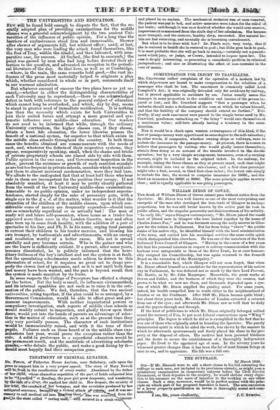COMPENSATION FOR INJURY TO TRAVELLERS.
Mn. CRAWPORD ' rather complains of the operation of a. modern law by which shipowners are bound to make compensation to the relatives of a passenger who shall be lost. The enactment is commonly called Lord Campbell's Act; it was originally intended only for accidents by railway, but it proved, applicable to accidents by sea. Juries usually assess the damages in some proportion to the condition and income of the person in- jured or lost ; and Mr. Crawford suggests "that a passenger when he embarks should make a declaration of the sum at which he values himself, and that the liability of the company should extend no further." Evi- dently, if any such enactment were passed in the simple terms used by Mr. Crawford, gentlemen embarkingon " the briny " would rate themselves at a maximum value ; self-love already having a tendency in the. same direction.
Now it would.be check-upon wanton extravagance of this kinch.if the fare or passage-money were apportioned in some degree to the self-valuation ; in other words, if companies, whether owning ships or railways, were to include the insurance in the passage-money. At present, there is reason to believe that passengers. by railway who would gladly insure themselves, abstain from- doing ao on account of the trouble involved. in the double operation; but by a very simple arrangement, insurance, even.of a varying amount, might be included in the original ticket. In the railway, for example, taking the threerclasses as they at present stand, each class might be sub-divided into two or three sub-classes; and a first class passenger mighttake a first, second, or third first-class ticket; the lowest rate simply to include his fare, the second to comprise insurance for 19001., and the- third an insurance for 2000i. or 3000d. The same principle applies toarery• class ; and'is equally applicable to sea-going passengers.


























 Previous page
Previous page